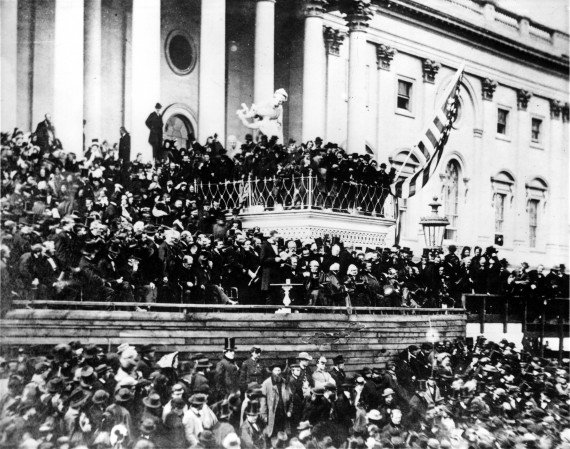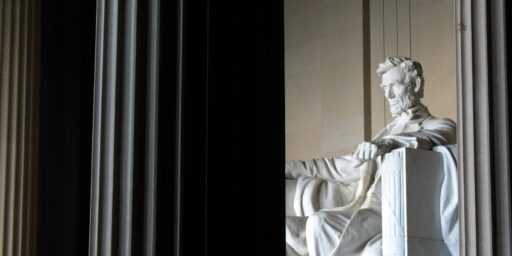With Malice Toward None, With Charity Toward All
One hundred fifty years ago today, as Union forces continued their encirclement of Robert E. Lee’ Army of Northern Virginia at Petersburg, Virginia, Abraham Lincoln delivered one of the great Inaugural Addresses in American history:
Fellow-Countrymen:
At this second appearing to take the oath of the Presidential office there is less occasion for an extended address than there was at the first. Then a statement somewhat in detail of a course to be pursued seemed fitting and proper. Now, at the expiration of four years, during which public declarations have been constantly called forth on every point and phase of the great contest which still absorbs the attention and engrosses the energies of the nation, little that is new could be presented. The progress of our arms, upon which all else chiefly depends, is as well known to the public as to myself, and it is, I trust, reasonably satisfactory and encouraging to all. With high hope for the future, no prediction in regard to it is ventured. 1
On the occasion corresponding to this four years ago all thoughts were anxiously directed to an impending civil war. All dreaded it, all sought to avert it. While the inaugural address was being delivered from this place, devoted altogether to saving the Union without war, insurgent agents were in the city seeking to destroy it without war—seeking to dissolve the Union and divide effects by negotiation. Both parties deprecated war, but one of them would make war rather than let the nation survive, and the other would accept war rather than let it perish, and the war came. 2
One-eighth of the whole population were colored slaves, not distributed generally over the Union, but localized in the southern part of it. These slaves constituted a peculiar and powerful interest. All knew that this interest was somehow the cause of the war. To strengthen, perpetuate, and extend this interest was the object for which the insurgents would rend the Union even by war, while the Government claimed no right to do more than to restrict the territorial enlargement of it. Neither party expected for the war the magnitude or the duration which it has already attained. Neither anticipated that the cause of the conflict might cease with or even before the conflict itself should cease. Each looked for an easier triumph, and a result less fundamental and astounding. Both read the same Bible and pray to the same God, and each invokes His aid against the other. It may seem strange that any men should dare to ask a just God’s assistance in wringing their bread from the sweat of other men’s faces, but let us judge not, that we be not judged. The prayers of both could not be answered. That of neither has been answered fully. The Almighty has His own purposes. “Woe unto the world because of offenses; for it must needs be that offenses come, but woe to that man by whom the offense cometh.” If we shall suppose that American slavery is one of those offenses which, in the providence of God, must needs come, but which, having continued through His appointed time, He now wills to remove, and that He gives to both North and South this terrible war as the woe due to those by whom the offense came, shall we discern therein any departure from those divine attributes which the believers in a living God always ascribe to Him? Fondly do we hope, fervently do we pray, that this mighty scourge of war may speedily pass away. Yet, if God wills that it continue until all the wealth piled by the bondsman’s two hundred and fifty years of unrequited toil shall be sunk, and until every drop of blood drawn with the lash shall be paid by another drawn with the sword, as was said three thousand years ago, so still it must be said “the judgments of the Lord are true and righteous altogether.” 3
With malice toward none, with charity for all, with firmness in the right as God gives us to see the right, let us strive on to finish the work we are in, to bind up the nation’s wounds, to care for him who shall have borne the battle and for his widow and his orphan, to do all which may achieve and cherish a just and lasting peace among ourselves and with all nations.
Four paragraphs, and just 698 words, and yet it is considered one of the greatest speeches in American history. Just over a month later, on April 9th, the war effectively ended with Lee’s surrender at Appomattox Court House, and Lincoln himself would be dead just six days after that after having walked the streets of the former Confederate capital just days earlier.







This and the Gettysburg Address: Two of the great speeches anywhere, anytime.
Powerful speech, but if it had laid out a post-war agenda, the Reconstruction may have gone much smoother. You could argue that the years that followed Lincoln’s presidency were the single period that the country most needed a blueprint. Maybe I’m just in a contrarian mood, but shouldn’t we consider the speech a failure?
Lincoln would have had to deal with the Radical Republicans just as Johnson did, but I tend to agree with those historians who believe that, as a Republican himself, he would have been in a much stronger position to push forward the less punitive form of Reconstruction that he favored and which Johnson tried to adopt.
It is one of the great “What Ifs” in history.
@Doug Mataconis: it’s hard to believe that the Radical Republicans were once the good guys…
Comment on the Address:
“I believe it is not immediately popular. Men are not flattered by being shown that there has been a difference of purpose between the Almighty and them. To deny it, however, in this case, is to deny that there is a God governing the world. It is a truth which I thought needed to be told; and as whatever of humiliation there is in it, falls most directly on myself, I thought others might afford for me to tell it.”
A. Lincoln, writing to Thurlow Weed.
@Pinky:
The South lost its best friend in the North when Lincoln was killed.
@sam: Agreed. But shouldn’t an inaugural address set the tone for an administration? Granted, the war wasn’t over yet, but it was foreseeable. I’m thinking that Lincoln should have spelled out his post-war agenda in this speech and provided a blueprint for his successor.
@Pinky:
Well, if you are in that kind of mood, you may as we throw out the premise that Santa Clause is a socialist…
To suggest that it was the fault of Lincoln that the reconstruction was a perceived failure is preposterous, sir!
As all politics is local, I would propose instead that it was the local politicians that worked to maintain the pre-war status quo in the south that caused the failure.
As an example, I give to your The Southern “Black Codes” of 1865-66 as well as Black Codes
While the Enforcement Acts were passed, and some change occurred, too many other activities were overlooked as the north (or more rightly stated, the federal government) was complacent in this as well, turning a blind eye to the activities in the south, with the interest of maintaining a peace in a reunified nation… while all the time setting it’s sights on the continued expansion into land in the western North American region.
Have you heard of Whitcapping? As a Colorado resident, I am always amazed by the stories of Governor Benjamin Stapleton
But let’s not talk of that when we have a god given right to rule the savages… Manifest Destiny!
harrumpfh….
Moderation purgatory.
I was at the Lincoln Memorial once with my father-in-law. He had the wrong glasses with him to read the walls, so he asked me to read the 2nd Inaugural out loud to him.
I tried, but failed. I got about 2/3 of the way through before I choked up so badly I couldn’t talk. If you think it’s powerful on the page, try speaking it aloud.
@Pinky:
I don’t want to be harsh, but are you tone-deaf?
Back in the mists of the distant past schoolchildren were sometimes required to memorize the Second Inaugural. I still have it committed to memory.
There are virtues to memorization It increases your range of expression by giving you a ready repertoire of phrases. And you don’t need an smartphone or Internet connection to access it.
It can also promote joining the common culture.
Oh? Was Reconstruction too harsh? Or perhaps not harsh enough…
@Pinky: How dare that man allow himself to be assassinated before the job was done!
(really, pretty dumb comment)
@Pinky:
If only he knew he was going to be killed I guess.
No president assumes he’s going to get killed, but presidents regularly spell out their agendas more concretely than this.
@Dave Schuler: I can still do about two-thirds of the Gettysburg Address from memory. At least, I think I can. I probably have a few nor’s and rather’s wrong.
In that horde of people, just feet from Lincoln, lurked one of the most infamous characters in world history: John Wilkes Booth. Did he already have the beginnings of a plot in his mind on that day ?
Think about this – major questions and rumors about that assassination still persist to this day.
Consider these oddities: General Grant at the last minute backed out of attending the Ford’s Theater play that evening with Lincoln. If he had gone, history could very well have been re-written Why did he back out ? Was he warned off ?
Booth’s escape route went right over the only unguarded bridge out of Washington. Who was responsible for that ?
The autopsy of Booth showed major inconsistensies. Some said the body resembled Booth, but “wasn’t Booth”.
The man in charge of the hunt for Booth, Lafayette Baker, later died of poison. Who was responsible ? Why ?
Boston Corbett was hailed as a hero for killing Booth. Yet there is no proof that he did. Corbett was later put in a mental hospital, and disappeared !
Booth had a diary – with several pages missing, removed by Sec. of War Ed Stanton. Pages that are probably in some government file; never to be released. Why not ? What was written on these pages ?
The so-called Booth conspirators were tried by military tribunal (irregular and probably unconstitutional) and not allowed to say one word in their defense before being silenced by execution. What would they have revealed ? This also included the Surratt woman, who knew nothing of Booth’s plans.
Rumors persist to this day that Booth did not die in a barn as we have been taught in history classes, but escaped maybe to England.
Booth family descendants will not participate in any dna testing to prove if JW really was killed in the Virginia barn.
Here are two interesting sites that give more information about the Booth conspiracy:
http://www.theverge.com/lincolnassinationconspiracy
http://www.rogerjnorton.com/lincolnassassination
Author and historian Brad Melzger has a book coming out about this. The book by Bill O’Reilly is a good, concise work with the essential facts, photos, and
@Doug Mataconis:
Right if Reconstruction had not been so punitive the south would have been fine with it, especially with that nice man Abraham Lincoln as President keeping the Radical Republicans in line. Tyrell’s theories are more plausible…
@pinky,
If you don’t see that speech as setting a tone……. shaking my head.
@Doug Mataconis: Possibly. While both Lincoln and Johnson were opposed to some of the measures the Radical Republicans later pushed through Congress, Lincoln would have had the good sense not to oppose the 14th Amendment and make it a reason for voters to publish the Republican party.
@Pinky:
And that’s just one reason you ain’t Lincoln.
Evidently, much of The South did not get the word that the Civil War is over.
I was able to have a private tour of Fords when it re opened in 1968. We were able to get on the stage and re-trace Booth’s footsteps after he lept and went out the back stage door to his horse waiting for him behind the alley. We then were taken by car to follow the route he took.
Fords and the Roman Forum where a plaque marks the spot where Caesar collapsed after being knifed in the Curia are both hair raising, chilling experiences which bring history to life as you can literally stand physically where events which changed the world happened.
And yes if you blow up the pic above, booth can be seen be seen under the statue above on the balcony on the right and the co conspirators are visible below Lincoln on the left.
@Tyrell: Don’t forget the chemtrails.